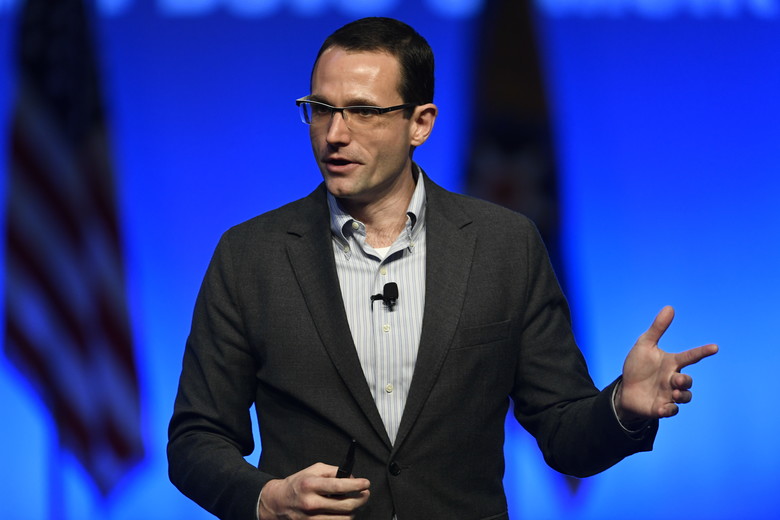Innovation IS The New Battlefield: Roper


Will Roper, Air Force assistant secretary for Acquisition, Technology and Logistics
WASHINGTON: America’s military needs to harness the power of the US venture capital market to stay ahead of China, and ensure that Beijing cannot buy innovative defense tech out from under the US government, says Air Force acquisition czar Will Roper.
“You look at the direction the direction the world is going, the threats that we face, and innovation is going to be its own competitive domain — almost a battlefield. We’ve got to win the innovation battle,” Roper told reporters yesterday during Air Force Space Pitch Days in San Francisco.
“Again, this is about innovation as a battlefield. Capital is a part of it, Companies that can’t get capital from us fast enough will find foreign investments that they gotta take to keep from going under,” he said. “We understand that. So, shame on us if the reason they’re accepting foreign investment is because we couldn’t talk with them and work with them fast enough.”
Roper said that not only is China throwing large sums of money at its own firms so that they can compete, and even dominate, in the global marketplace (think Huawei and 5G), but Beijing also is aggressively seeking to invest in innovative US tech firms. In particular, China has been looking to fund Silicon Valley start-up companies, who often have to scramble to find financial backers in the short term to stay viable long enough to bring their ideas to fruition.
To keep in the game, Roper said, DoD has to change its entire acquisition model and mindset. “It’s not going to happen if we, the government, can’t find a new model for [engaging] private industry.
“It’s not enough to develop and procure systems anymore. We’ve got to get in the business of of buying ideas and generating ideas,” he said.
This means investing in design, rather than the current paradigm where most Air Force dollars are spent on sustainment or upgrades, Roper said. The fact that much of the Air Force’s current inventory, whether it be aircraft or satellites, is decades old is a key factor in why despite rising budgets service capabilities are starting to deteriorate, according to a recent study by the Center for Strategic and International Studies (CSIS).
It also means being able get Air Force funding into the pockets of innovators fast enough to make a difference in their market cycle. Events like the Space Pitch Day sessions Tuesday and Wednesday are new approaches the Air Force is testing out in order to position itself in the tech marketplace as a core investor, Roper and Lt. Gen. John Thompson, head of Air Force Space and Missile Systems Center, said. The Space Pitch Days event, like similar events held earlier this year in Boston and New York, brought together startups that have caught the Air Force’s eye via its AFWERX innovation hub as potential ‘customers’ in service program offices. The aim is to award on the spot Phase 2 Small Business Innovation Research (SBIR) grants, worth between $50,000 and $750,000 to companies found worthy.
As first reported by colleague Debra Werner, the Air Force awarded $22.5 million to 30 companies during the two-day pitch sessions in $750,000 increments. Another 15 were chosen to submit follow-on pitches for up to another $750,000 award; a third group of eight startups are being given a chance to ask for up to $3 million. Those eight firms are: Analytical Space, Arete Associates, Lucid Circuit, Numerica, Orbitron, Roccor, Space Micro and Synantech. Another seven have submitted proposals for to bring their $750,000 awards up to $1.5 million each: Aptima, Chandah Space Tech, Strategem Group, Virtualitics, Launcher, nouSystems and Orbital Micro Systems.
More importantly, said Roper and Thompson, the Space Pitch Days and others like them expose promising small companies to potential financiers at banks and venture capital groups who may invest with a particular eye to the commercial market.
“We are not trying to create defense companies,” Roper stressed, explaining that one of the criteria to winning a Pitch Day SBIR award is that the startup has demonstrate its commercial market viability.
It is the possibility of enticing venture capital money that the Air Force believes could be the game changing strategy for fixing its own acquisition woes. The idea is that by giving an Air Force seal of approval by committing SBIR funds to certain small businesses, venture capitalists will feel safe enough to also invest.
“We have the ability to guarantee government matching dollars to private investors. We’ve done a Pathfinder on that,” Roper said, using $50 million in Air Force funds. “And we’re seeing very good matching ratios, where our government dollars are matched three to one or four to one by private investors.”
The ultimate goal of the Pitch Day process is to help entrepreneurs of interest to the Air Force move into Phase 3 SBIR contracts, at which point they have the potential to transition into an Air Force program of record, Roper said, and furthermore start “on a path to selling to the world” via venture capital matching funds.
Phase 3 SBIR contracts, where a company actually starts “productizing” its technology or service, can involve from $3 million up to $50 million in Air Force funding, he explained. It is the “launching pad” where the Air Force expects to “see big dollars on the table” from the private sector.
Roper said that one of the goals of the Space Pitch Day effort is to get a better understanding of how to use the Phase 3 matching concept “so we can start making defense unicorns.”
“That must happen if we’re going to compete against countries like China long term,” he stressed. “If unicorns in defense are only started by billionaires, we’re going to lose. We need companies that have ambitions, without that billionaire backing, to find a way to start up through us.”
